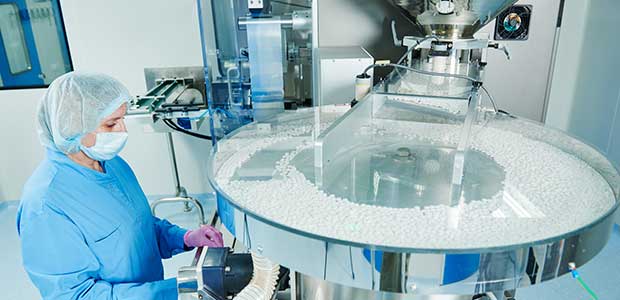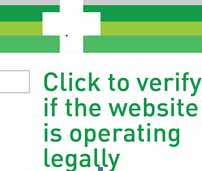
According to the World Health Organization (WHO) definition, a counterfeit medicine is "a medicine, which is deliberately and fraudulently mislabelled with respect to identity and/or source. Counterfeiting can apply to both branded and generic products and counterfeit products may include products with the correct ingredients or with the wrong ingredients, without active ingredients, with insufficient ingredients or with fake packaging".
The WHO reported that 10% of the medicines offered for sale globally are counterfeits. Amongst the drugs promoted online, 90% are counterfeit medicines and are life-threatening.
Many MENA countries are used as transhipment hubs and/or manufacturing and distribution centres for counterfeit medicines.
To confirm its active role in combating the marketing of counterfeit medicinal products, this month the UAE Ministry of Health and Prevention (MOHAP) held the "Second Emirates International Conference on Combating Medicinal Products Counterfeiting", in partnership with the French international pharmaceutical company Servier.
The event attracted more than 800 attendees, with speakers from UAE and Saudi Arabia Health Authorities, international organizations and international pharmaceutical companies.
The conference promoted public awareness about counterfeit medicines and primarily discussed:
Increasing medicine supply chain traceability: the serialization challenge
The serialization requirement
Serialization refers to the process of applying a unique identifying number to each final dosage unit produced by a drug manufacturer. This number is stored in a database, which increases the supply chain traceability and ultimately enables the relevant protagonists to confirm the legitimacy of the drug. As a result, serialization could reduce the occasions on which falsified medicines may enter the legitimate supply chain.
Serialization has become a global requirement but there is no global standard.
In the United States, the Drug Supply Chain Security Act requires that manufacturers mark packaging with a product identifier, serial number, lot number and expiration date by 2017.
In the European Union (EU), companies who manufacture, sell or dispense medications in the EU have until 2019 to comply with new track and trace regulations outlined in the Falsified Medicines Directive 2011/62/EU ("the Directive"). These involve safety features (seal on the outer packaging and unique identifier) and compliance reporting and verification.
The Directive requires the safety features to be applied to all medicines subject to medical prescription and to non-prescription medicines if they are at risk of counterfeiting. The unique identifier is aimed at allowing operators across the various stages of the medicine supply chain (manufacturers, wholesale distributors, pharmacists) to verify the authenticity of the medicine.
Implementing serialization
To the extent serialization requirements vary from country to country, pharmaceutical companies are facing challenges in implementing their track and trace strategy so as to limit the impact on the production schedule.
In this context, the Conference offered workshops on how to implement serialization, with presentations of the most recent serialization software versions and best practices to simplify companies' ability to meet the requirements of the new global regulatory framework.
Fighting against illegal online sales
In the European Union alone, approximately 3,000 websites are selling medication illegally.
Mr. Alistair Jeffrey, Head of enforcement at the UK MHRA, explained the requirements introduced by the Falsified Medicines Directive regarding the registration of suppliers of medicines 'at a distance'.
The Directive requires Member States to introduce national arrangements to register suppliers of medicines “at a distance”, which involves the adoption of a common EU logo.
Since July 2015, all websites supplying medicines at a distance are required to display the following EU logo and provide a hyperlink to the national website of the Member State in which the person offering to sell medicines at a distance is established:

GCC update: latest initiatives
Saudi Food and Drug Authority (SFDA)
Saudi Arabia is the largest pharmaceutical market in the GCC region with 60% of regional share. The pharmaceutical market in Saudi Arabia is forecast to reach 4.7 billion USD this year.
Ensuring the security of the medicine supply chain is one of the main goals of the SFDA. In this context, the SFDA has limited the number of ports of entry for drugs in Saudi Arabia to 14 ports (out of 33) and has staffed these ports of entry with pharmacists whose mission is to analyse samples of the medicines shipped to the Kingdom.
When testing samples, inspectors are now using the Raman portable spectroscopy device, an advanced technology used to detect fake medicines. This device allows the identification of fake drugs through a non-destructive test that verifies the chemical composition of a medicine. Even if the tablet contains the active ingredient, the device would detect any wrong excipients and fillers.
The SFDA has also been working closely with pharmaceutical companies (such as Pfizer and Merck) to detect any counterfeit medicines in pharmacies in targeted areas of the Kingdom. For this purpose, the SFDA has been conducting market surveys on behalf of such pharmaceutical companies, collecting targeted samples from pharmacies and sending them for analysis.
The regulatory scope, which currently enforces bar code regulation, is scheduled to expand this year to include serialization of all pharmaceutical products, which will significantly strengthen the existing measures aimed at combating the infiltration of counterfeit medicines in the Saudi supply chain.
UAE Health Authorities
As part of the latest initiatives undertaken in the UAE against fake drugs, the HAAD has launched a program aimed at conducting periodic laboratory testing of medicines samples distributed in Abu Dhabi, to confirm product safety, quality and authenticity.
In addition, the UAE Ministry of Health has announced that it will launch a new device aimed at detecting counterfeit medicine consignments in seven seconds.
The Ministry has also started distributing flyers to consumers, to raise their awareness on how to identify and report counterfeit drugs, and to pharmacists, who play a pivotal role in controlling attempts at infiltration of falsified medicines into the legitimate supply chain and in reporting counterfeit medicines.
On the legislative front, UAE Federal Law N°4 of 1983 on the pharmaceutical profession and industry shall be updated by the end of this year to introduce new seizure procedures for suspected shipments, and to strengthen penalties against individuals and companies dealing with counterfeit drugs, in accordance with international best practices. The amendments are currently under discussion at the Federal National Council.
Also, the UAE enforcement authorities continue playing an active role in the fighting against illicit drugs.
Mr Tarifi, Manager of the Drug and Medical Product Department at the HAAD, highlighted successful raids recently carried out by the Dubai Department of Economic Development (DED), where more than one million counterfeit goods (drugs, performance enhancers and cosmetics) were seized in two warehouses for a value of 4.6 million USD.
Likewise, the Dubai Customs authorities recently seized a shipment from Mauritius containing 20,000 boxes with 556,000 imitations of Plavix, a medicine used to prevent blood clots.
While the UAE Health Authorities have been said to have successfully managed to eradicate the sale of fake drugs in hospitals and pharmacies in the country, counterfeit drugs are still offered for sale in the UAE through online platforms.
The proposed steps outlined during the conference, if adopted by the officials in the UAE and Saudi, should further assist in the battle against the trade in illicit pharmaceutical products. Whilst the introduction puts an additional burden on the manufacturers of genuine products, it should help to decrease significantly the quantity of illicit medicines coming into and through these countries.